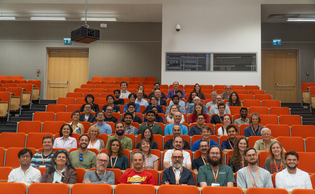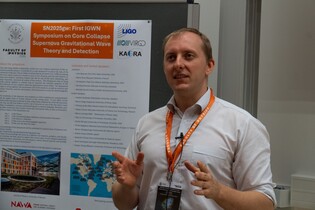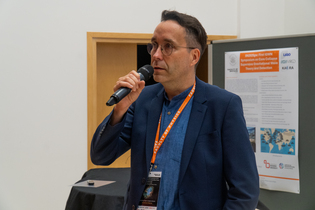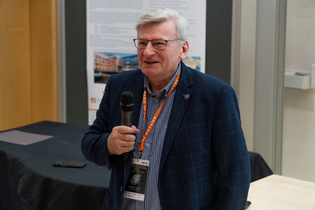SN2025gw: First IGWN Symposium on Core Collapse Supernova Gravitational Wave Theory and Detection
2025-08-01
From July 21 to 25, 2025, the Faculty of Physics at the University of Warsaw hosted the international symposium SN2025gw: First IGWN Symposium on Core Collapse Supernova Gravitational Wave Theory and Detection. This unique event has brought together two key scientific communities: gravitational-wave astronomers and theorists modelling core-collapse supernovae.
The symposium’s name reflects both the traditional naming convention for supernovae ("SN") and the abbreviation for gravitational waves ("gw"). The event is organized under the auspices of the International Gravitational-Wave Network (IGWN), a new organizational structure set to replace the current LIGO–Virgo–KAGRA collaboration. Following recommendations from the U.S. National Science Foundation, LIGO is expanding its cooperation with theorists, and the supernova modeling community is the first to be formally engaged.
– This year marks a very special occasion: the 10th anniversary of the discovery of gravitational waves. Remarkably, the very first gravitational wave source ever detected came from a system of two colliding black holes, said Dr. Marek Szczepańczyk from the Faculty of Physics, UW, the main organiser of the symposium. – As we celebrate that ground-breaking discovery, we also turn our thoughts to the future. There is growing intuition that this next breakthrough could be the observation of a core-collapse supernova — a truly rare, perhaps once-per-century event. As a community, we must be fully prepared to seize every scientific opportunity such a moment would offer. I would also like to remind you that the proof that gravitational waves are real and carry energy originates from this Faculty. It was Professor Andrzej Trautman who, in the 1950s, authored several seminal papers that laid the theoretical groundwork for our field.
Then, on behalf of the faculty authorities, the guests were welcomed by Vice-Dean Prof. Krzysztof Turzyński: - What truly distinguishes our Faculty is our spirit of collaboration. We thrive on bringing together people from diverse areas of expertise to build a creative scientific environment, and to enable discoveries that none of us could make alone. And that is exactly the purpose of this symposium: to unite theorists and experimentalists — and to create something greater than the sum of its parts. I encourage you to pursue bold, even wild ideas — just as Andrzej Trautman did. His courage and persistence — even in the face of scepticism from his supervisor, Leopold Infeld, a close collaborator of Albert Einstein — are an inspiration. Once again, welcome — and let’s make this an unforgettable and transformative week of science.
– It is my great pleasure to welcome participants of this symposium. This is the first edition of an event that I hope will become the beginning of a series of meetings for researchers working in the fields of gravitational waves and astrophysics. We are proud that this event is taking place at the University of Warsaw — the largest and best university in Poland – said Prof. Zygmunt Lalak, Vice-Rector for Research at the University of Warsaw. – We currently educate approximately 37,000 students and approximately 2,000 doctoral students. Our university belongs to many international alliances — the most important of which is the 4EU+ alliance, in which we cooperate with, among others, the University of Milan and the University of Geneva. Together, we are creating a new European University, which will ultimately issue a joint diploma to all students. Our faculty has a rich research tradition, especially in the areas covered by this symposium. We have one of the best astronomy groups in Poland, as well as leading research teams working in particle physics. I hope that the role of our university and its international recognition will continue to grow thanks to initiatives and projects such as this one – added prof. Lalak.
One of the key outcomes of the symposium will be a white paper summarizing the current state of knowledge and offering recommendations for national funding agencies. The journal Classical and Quantum Gravity will publish the symposium’s proceedings.
More information: https://indico2.fuw.edu.pl/event/17/









